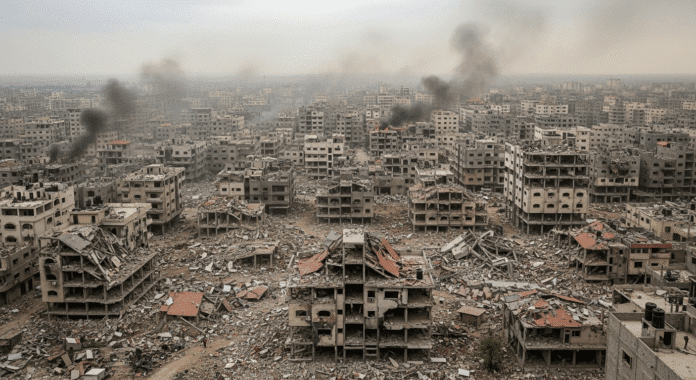Landmark Report Finds Systematic Intent to Destroy Palestinian Population
The international community received a stark wake-up call today as a UN Human Rights Commission delivered its most damning assessment yet of Israel’s military campaign in Gaza. The independent inquiry concluded that Israel has committed genocide against Palestinians, marking what experts call “the most authoritative UN finding to date” on the devastating conflict that has gripped the world’s attention since October 2023.
This groundbreaking report, released as Israel launches a new ground offensive in Gaza City, represents more than just another international condemnation. It provides a detailed legal framework that could reshape how the world responds to one of the most contentious conflicts of our time.
The Commission’s Devastating Findings
The three-member independent commission, led by former UN human rights chief Navi Pillay, spent two years meticulously documenting what it describes as a systematic campaign of destruction. Their 72-page report identifies four of the five genocidal acts defined under the 1948 Genocide Convention:
Killing members of the group through deliberate attacks on civilians and protected sites, creating conditions that cause mass death.
Causing serious bodily or mental harm through direct civilian attacks, severe mistreatment of detainees, forced displacement, and environmental destruction.
Deliberately inflicting conditions calculated to destroy the group by destroying essential infrastructure, blocking medical services, forcing displacement, and denying access to water, electricity, and fuel.
Imposing measures to prevent births including the December 2023 attack on Gaza’s largest fertility clinic, which reportedly destroyed 4,000 embryos and 1,000 sperm samples.
The commission’s conclusion rests not just on these acts, but on what it calls clear evidence of genocidal intent. “The responsibility for these atrocity crimes lies with Israeli authorities at the highest echelons who have orchestrated a genocidal campaign,” the New York Times reported from the commission’s findings.
Words That Reveal Intent
Perhaps most damning are the statements from Israeli leadership that the commission cited as evidence of genocidal intent. Prime Minister Benjamin Netanyahu’s vow to inflict “mighty vengeance” on that “wicked city” of Gaza revealed, according to Pillay, that he “saw the whole city of Gaza as responsible and a target for vengeance.”
Former Defense Minister Yoav Gallant’s declaration that Israel was “fighting human animals, and we act accordingly” alongside his announcement of “a complete siege” denying Gaza “electricity, water, food, fuel” painted a clear picture of intended destruction.
President Isaac Herzog’s statement that “it’s an entire nation out there that is responsible” for Hamas’s October 7 attack further demonstrated, according to the commission, a targeting of Palestinians as a group rather than combatants specifically.
These weren’t heat-of-the-moment remarks, the commission argues, but calculated statements that revealed long-term intent to destroy the Palestinian population in Gaza.
The Human Cost Behind the Legal Framework
The numbers tell a story of unprecedented destruction. Since October 7, 2023, nearly 65,000 Palestinians have been killed according to Gaza’s Health Ministry, with thousands more children among the dead. More than 90% of homes have been damaged or destroyed, healthcare systems have collapsed, and UN experts have declared famine conditions in parts of Gaza.
The commission noted that over 10% of Gaza’s population has been killed or injured since the war began—a staggering statistic that underscores the scope of civilian harm.
“Fear, fear, it’s all fear,” one Gaza City resident told CNN as families fled the latest offensive. “Explosions over our heads, all day.”
Israel’s Fierce Rejection and International Implications
Israel’s response has been swift and categorical. The Foreign Ministry dismissed the report as “distorted and false,” calling the commission members “Hamas proxies” who rely “entirely on Hamas falsehoods.”
Israeli Ambassador to the UN Daniel Meron called the report “scandalous” and “fake,” while officials pointed to their own studies arguing that allegations of starvation and deliberate civilian targeting lacked evidence.
But the commission’s findings carry weight beyond diplomatic protests. The report joins a growing chorus of international voices, including the International Association of Genocide Scholars, which passed a resolution with 86% support declaring that legal criteria for genocide had been met.
What Happens Next: Legal and Political Consequences
The commission’s findings, while independent and not officially representing the entire UN, create significant legal and political pressure. The report urges all UN member states to fulfill their obligations under the Genocide Convention to prevent and punish genocide, including:
- Immediately ceasing arms transfers to Israel
- Ensuring corporations and individuals in their jurisdiction don’t aid genocide
- Examining the involvement of officials mentioned in the report
The International Criminal Court already has arrest warrants pending for Netanyahu and former Defense Minister Gallant. This new report could strengthen those proceedings and encourage additional legal action.
“There is an accumulated impact,” Middle East expert Yossi Mekelberg told NBC News. “It isolates Israel further and further in the international arena.”
European Leaders Speak Out
The timing couldn’t be more significant, as European leaders responded to Israel’s new Gaza City offensive with unprecedented criticism:
UK Foreign Secretary Yvette Cooper called the assault “utterly reckless and appalling,” while Dutch Foreign Minister David van Weel warned of increased casualties and forced displacement. Germany’s foreign minister called it “completely the wrong approach,” and Sweden expressed being “extremely worried.”
This growing international isolation reflects the mounting pressure Israel faces as evidence of systematic destruction continues to mount.
The Road Forward: A Moral and Legal Imperative
Commission Chair Navi Pillay delivered a stark warning to the international community: “The ongoing genocide in Gaza is a moral outrage and a legal emergency. Member States must act now. There is no need to wait for the International Court of Justice to declare it a genocide.”
Her words carry particular weight given her experience presiding over Rwanda’s genocide tribunal. The comparison is deliberate and chilling.
The report recommends immediate action: a ceasefire, unhindered UN access to Gaza, and accountability for those responsible. Most importantly, it calls on nations to stop being complicit through inaction.
A Defining Moment for International Justice
This UN commission report represents more than documentation of alleged crimes—it’s a test of the international community’s commitment to the principles established after World War II. The Genocide Convention was created precisely to prevent the horrors the commission now documents in Gaza.
As families continue fleeing Gaza City under bombardment, as children suffer from malnutrition, and as the death toll climbs, the world faces a choice. Will it uphold the legal frameworks designed to protect vulnerable populations, or will political considerations override moral imperatives?
The commission has provided the evidence. The legal framework exists. The question now is whether the international community has the will to act on both.
The time for passive observation has ended. The UN commission’s findings demand action—from governments, institutions, and citizens worldwide. The principles that govern international law and human decency hang in the balance, and history will judge how we respond to this defining moment.




